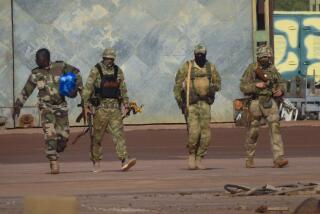Somalia’s spreading war
If there were any doubts that the bloody conflict in Somalia could pose a threat to African stability, they were buried in the Ugandan capital of Kampala this week along with the 76 people killed in twin bombings orchestrated by Somalia’s extremist Islamic militia known as Shabab. The attacks, which targeted fans watching the World Cup final on televisions at a rugby club and an Ethiopian restaurant, were, in fact, a triple blow against Uganda, Ethiopia and what the radical group perceives to be ungodly Western influences such as soccer.
The United States, United Nations and African Union peacekeepers support a weak transitional government led by President Sheik Sharif Sheik Ahmed that controls a small part of the Somali capital of Mogadishu, while Shabab’s extremist rule extends over large swaths of the country. Shabab is largely focused on ousting the government, although the coordinated attacks in Uganda illustrate the rising influence of foreigners allied with Al Qaeda and their ambitions for global jihad. The two interests may have aligned in the strike in Uganda, which contributes a large part of the peacekeeping force.
This was Shabab’s first strike beyond Somalia and, as such, was a kind of warning shot. The militia has recruited Somali Americans and fighters trained in Afghanistan. It has threatened Uganda and Burundi, which also provides a large contingent to the peacekeeping force, and promised more violence unless they withdraw their forces. Which is precisely what they must not do. A Shabab suicide attack in Mogadishu in December that killed three government ministers was widely unpopular among Somalis, and the group’s harsh brand of Islam is imposed through fear. In addition to attacking its own people, Shabab has now demonstrated that its lack of respect for civilian life knows no borders. It is a menace to U.S. allies and interests, as are its fellow jihadis from Pakistan to Sudan.
While tracking those who carried out this crime, the U.S. government and international community must focus on building a Somali alternative to Shabab. If the Ahmed government is to survive, it must be able to offer Somalis security and basic services. It will have to broaden its base possibly even including some of the less radical factions of Shabab. Smart, consistent and behind-the-scenes attention, as well as resources, are required if the jihadis are to be isolated before Somalia’s conflict becomes an even greater regional challenge.
More to Read
Sign up for Essential California
The most important California stories and recommendations in your inbox every morning.
You may occasionally receive promotional content from the Los Angeles Times.










